#zuko learns about consequences
Note
Do you know of any fics in which actually Zuko learns about consequences?
A Far Green County by @lightdancer1 as far as I can remember has Zuko learning about consequences (its been a minute since I've read it so I may be wrong). Light's other fics leans into this too, so I would definitely recommend reading them. I think @balsa-margarita also has some fics where Zuko learns about consequences. @seyaryminamoto did an excellent one shot for the final day of Sokkla Saturdays 2022 in which Zuko learns about consequences since his actions lead to him being isolated from his friends. Pretty sure that there's more fics out there that follow this theme, I just don't know about them.
10 notes
·
View notes
Text
The Agni Kai between Ozai and Zuko was one of the smartest, best additions to the show. I see people complaining about Zuko "fighting back", as though that's a bad thing or takes away the victimhood of his situation.
Zuko is prepared to fight someone else. Then his dad steps in. There's already a ton of pressure, and now confusion overwhelms, because wth why would he fight his dad and HOW. He doesn't want to fight him. But this Agni Kai's point is for honor, to prove himself to him, and a) he is firstly DEFENDING himself from his dad who is the one who starts fighting him hard. (throwing fire at him?? Hello??? Is he just supposed to take it??) b) don't you think Ozai would think worse of him if he didn't do anything at all? And don't you think Zuko takes that in consideration pretty quickly as his dad attacks him?
It's clear Ozai will fight. Now Zuko looks confused and scared during the fight, rightfully so, and he tries to figure out how far this will go. My wife keeps saying that he is sparring (and that y'all don't know about sparring, lol), and that doesn't mean you have to hurt your opponent, not the way Ozai intends. Zuko engages defensively, and then fights his father, hoping that's enough to show him that's he's good at this, that he's skilled. It doesn't have to go as far as Ozai takes it, it COULD just be sparring. Zuko COULD jusy try to show him what he's learned and hope his dad is pleased enough. Isn't that what he keeps trying to do anyway? Get his approval? Both he and Azula. Unfortunately, we know that's impossible.
The unfolding of this Agni Kai drives home the cruelty of Ozai in an even more intense way to me. Because no matter how well Zuko fights, it's not about skills, it's about how far he's willing to go, that's what Ozai is judging. The mentality behind it. Zuko isn't willing to hurt his father when he could, he holds back! That is his "weakness". And the way Ozai punishes this by doing what Zuko refused to do - burning Zuko where Zuko could've burned Ozai - that is a horrible reminder of this "failure" to go far enough, and the consequences it entails.
Zuko's scar now isn't just random placement, it has meaning behind it beyond the basic cruelty of Ozai hurting his child. It directly references Zuko's "weakness". Ozai showing him how it's done directly on his face, serving as a constant reminder that he couldn't be the strong one, so he got hurt by the one who was willing to be.
The sequence of Zuko holding back and Ozai NOT holding back but purposefully pausing and choosing to punish him this way was mind-blowing. Such a powerful, terrifying moment that makes Ozai feel even crueler than in the OG.
I don't think Zuko not engaging in the OG is bad at all, it virtually gets the same result; but I also don't think it's bad for him to decide to engage. It doesn't take away anything from the point, for me, the way it plays out in the live action takes it further. It examplifies Zuko and Ozai's relationship and Zuko's efforts - never enough - perfectly.
#Natla#atla live action#Live action ATLA#Agni kai#Zuko#HOW DO I CONVINCE YOU THIS SCENE IS INCREDIBLE 😭#It took me by surprise so much i was holding my breath#ozai#avatar the last airbender#avatar live action
939 notes
·
View notes
Text
So about Netflix's the Last Airbender....
I am literally so confused you guys. You made me think I would HATE this show. And I LOVED it. Me. Known perfectionist and hater.
Katara was lovely. Yes, she started as a more soft spoken character than her cartoon version, but she was still passionate and hopeful throughout, just visibly unsure of herself. I think people were thrown off by this actress' natural way of expressing herself, which is Different from animated katara for sure, but not bad. Then she spends the whole season growing in Confidence and Fire. I Adored her fight with Paku, it really did feel like a payout of the whole season's development, and the bending kicked ass!
The Bending Kicked ass!!! The martial arts was fun and fast and creative and exciting! It looked SO good. That alone would be enough reason for me to watch and enjoy any show.
Zuko's actor was fantastic. He really captured the rage and confusion of this 16 year old banished prince. And there were so many Added moments between him and Iroh wich to me enriched their relationship. Like YES! This is why I'm watching, to see more of them, to see things done a little differently.
Iroh facing the consequences of his actions at Ba Sing Se!! That's what I'm here for!
Zuko's relationship with the men on his ship! That's what I'm here for!
The Extra layers we get to Ozai manipulating his children!
Also no one is talking about Admiral Zhao, who I had SO much fun with. I feel like they slightly fleshed out his character in a really dramatic way, really developing the hubris and frankly insane grasping ambition of someone who would kill the moon. I completely enjoyed this wilder, less controlled version of him, who comes up through the season from basically nothing and no one!
I am OBSESSED with King BUMI and his anger and disillusionment with the world! Like this was SO real. Living a hundred years of futile war would do that!!!! It is one of my favorite changes to the whole series. This new layer of emotion and character depth is what I'm here for!
Sokka was SO funny. He literally had me laughing out loud so often. That actor GETs Sokka, and GETS the way his humor is delivered. And is also able to tap into the more vulnerable side of him. People said he was "obsessed" with leadership. WHAT? That is a young person trying desperately to do his best and to try and find his place in the world, to figure what he has to offer. I loved his pride at hearing the Mechanist say that he would make a good engineer, and the sweetness of the moment that Yue's father says that he can be a hero without being a warrior. Sokka does so much growth in this series, in understanding himself and life.
And his chemistry with Suki was adorable!! I even like him and Yue (who was a totally unexpected sweetheart, despite her terrible wig)!! Like he has that same ability that Sokka has in the original to Connect with people.
Aang was great! He WAS fun loving and sweet and funny. I don't know what you guys wanted. Cartoons are always bigger and more exaggerated than live action. People's eyes swell up an, birds fly around their heads, and there are funny sound effects. That larger than life quality is the strength of animation! You have to look for different strength in live action. Like the SUBTLETIES of the acting choices. This little actor brought so much kindness, innocence, and strength to Aang.
And I FELT his frustration at being asked to do this at 12, his fresh hope anytime it looked like someone more experienced would be able to help him and no one did, and that's why he didn't learn waterbending this season, because he kept waiting for an freaking ADULT to show him the way, to help him carry this immense burden, but every adult he meets asks him for help instead, asks him to carry it himself, and then the finale hits and he realizes that there won't be any adults helping, he does have figure this out himself, and he makes the hard choice, takes on responsibility more than his years and offers himself to the ocean spirit, and he might have been lost entirely if not for Katara!
And that counter running theme to the show pays off: that he doesn't have to do it alone. He may not have more experienced guidance, because the adults have let him down again and again, but his friends will be with him, and they will figure it out together!
This is there throughout the series! Katara tells him this about learning waterbending, when he says he still wants to wait. Bumi tells him this in the palace at Omashu, and Aang sees the faith he has in his friends repaid!
I like these changes! And the show still found time for silly fun adventures and character building moments.
The show was never going to be the animated original. That is already a Masterpiece, and it frankly did NOT need to be adapted at all. I did not WANT a live action adaptation. I was adamantly convinced I would hate it. But the changes that they netflix show gave are what I Iike most about it. If I want to see Zuko say "you rise with the moon, I rise with the sun," I will go watch the animated original, because that version is perfect. And now, if i want to see Zuko say "Lu ten would have been proud to have you as a father," and see iroh pull him into a tight hug, I can watch this live action version, which is very good too. I'm going to disagree with most of the people on here and say that the Netflix's Avatar: The Last Airbender, DOES capture the heart of what we liked about the original show. It's spirit, fun, excitement, and characters. And the changes made are the reason we should be watching.
960 notes
·
View notes
Text
ALTA Live Action Season 1 Initial Thoughts (Spoilers)
I just finished the season, and holy shit!
Quick things that need to be addressed/debunked:
“Sokka is no longer sexist”
I dont know what people were talking about when they talked about Sokka’s “sexism” being removed. It’s still there! But not in the overly exaggerated comical way it was in the original.
In fact, it’s more in line with ancient practices of indigenous tribes where men are seen as protectors and providers while women are expected to nurture. It’s not the same “boys are better than girls” narrative in the original.
Additionally, Suki still beats the fuck out of Sokka and humbled him really quick. They’re super cute by the way. And I love Suki’s “I like my men a little stupid” vibe. She’s great.
“Aang doesn’t run away like the original!”
That is not true. He does run away, but not because he’s trying to get away from the temple but instead to get some air because he feels overwhelmed. He’s more like taking a quick break and planning to come back. It’s not exactly the same, but almost. It also is done in a way where his guilt feels more justified.
“Katara doesn’t talk about her mom anymore like the original”
This is true… BECAUSE THEY SHOW INSTEAD OF TELL. I was honestly not prepared to see the death Kya in such graphic detail and how Katara was in the room hiding when it happened. It’s honestly really sad and more heartbreaking.
Plot:
The timeline seems to be ambiguous compared to the original series where it was “end of current year.” In fact, they repeat “three years” a few times, which makes me think if the series get greenlit for more seasons, it would be over a three year period.
Jet is still villainized but given more nuance and not a simple "good v bad" way like the original.
Zuko’s story about how he got his scar has additional lore that makes him come across as even more selfless and compassionate. The additional context of the platoon he advocated for in the war meeting, becoming his current crew, really added to the story.
Eradicated the nepotism baby plot point with Pakku only training Katara when he finds out he used to date her grandma. Instead, Katara proves herself and ends up teaching the other male fighters the techniques she learned from watching other benders use their elements and mimics them.
This season doesn’t have Aang learning any waterbending, but rather facing his trauma and the consequences of his actions. He get roasted by all his past lives. Which is an interesting choice, but I think it works well in how they executed it.
This season seems to actually be Katara focused and her journey of learning waterbending which I honestly loved because it really hits home the element of “water” being the story of an untrained waterbender learning her element. But, I do think Aang could’ve learned a little bending. It felt a little off.
Katara ends up advocating for all waterbending women and ends up leading an army of both men and women during the siege. She’s really bad ass and is given the title of master without being formally trained by Pakku. She made herself a master.
I think the timeline is a little wonky because of how much they had to fit in with the limited episodes they had.
Kuruk is given respect! I loved that.
June actually seems into Iroh which I thought was a funny but cool way to flip the script from the original.
The relationship between Zuko and Iroh is really beautifully executed. I love the depth they added with flashback scenes and their bond prior to the Agni Kai. It also wasn’t as frustrating watching Iroh and Zuko’s dynamic because Iroh communicated with Zuko in a way he could understand with straight answers rather than seeming to actively sabotage him with cryptic puns and shenanigans like the original.
They changed the love triangle with Yue Hahn and Sokka to be very healthy. They gave Yue autonomy and a choice in her relationship- which- again- is much more in line with indigenous cultures. Also, Hahn and Sokka’s relationship is really supportive and full of respect and no ill will.
They way they handled grief and the realities of war with the loss of life was very well done and really drove home the point that this is a war and these are child soldiers.
There’s a lot more but these are my initial thoughts. Will probably post more later.
Shipping:
Kataang is all but removed. Literally DOA. There is no indication of a crust on either side. It’s painted like a sibling relationship, which is like the original, but this time everyone seems to be on the same page. But, I swear the writers had to have read ZK fics because damn.
They canonized a popular Zutara theory/hc about the cave of two lovers and how the crystals would light up once it went completely dark instead of a “kiss” activating the crystal glow.
Speaking of the Cave of two lovers. They keep the Oma and Shu story with red and blue coloring. Making it come across more as foreshadowing than a direct link to the present tunnel story.
Sokka is put in Aang’s place with Katara in the tunnels and turned it into a story about the love of family and sibling bonds. Aang wasn’t even present.
Zuko and Katara share a meaningful look when they first see each other and continue to have a Katara centric scene followed by a Zuko centric scene and vice versa.
The scarf scene. I will not be elaborating further. If you know, you know.
Zuko and Katara fight scene in the North is epic. He still taunts her with almost the exact same dialogue but it’s so sassy- I love the banter.
Suki and Sokka were really cute and the actors had great chemistry. I think Yue and Sokka was really rushed and didn’t really feel anything about them, honestly. But I attribute that to lack of episodes to develop all that plot.
486 notes
·
View notes
Text
Azula Respected Mai The Most
I just saw another Reddit comment saying Azula wasn’t friends with Mai and mostly only cared about Ty Lee. And I just gotta say…
I respectfully disagree.
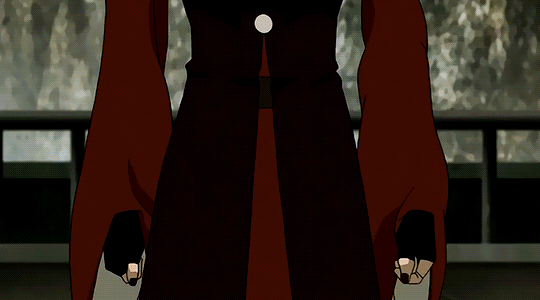
The Boiling Rock proves Mai meant a lot to Azula.
First, Mai publicly commits treason and betrays the Fire Nation and Azula.
What does Azula do? Order the guards away and gives Mai a chance to explain herself. She even says “I never expected this from you” and “you of all people know the consequences”. Put a pin in that for a moment.
Giving a traitor who just publicly and flagrantly betrayed you and your nation to help an even worse traitor to your nation (Zuko, who on a personal level hurt both Mai and Azula by doing so) a chance to explain themselves is already significant. But even moreso is the fact that Azula doesn’t make a single move to harm Mai until Mai purposely and effectively hits Azula’s trauma weak point like the master marksman she is.
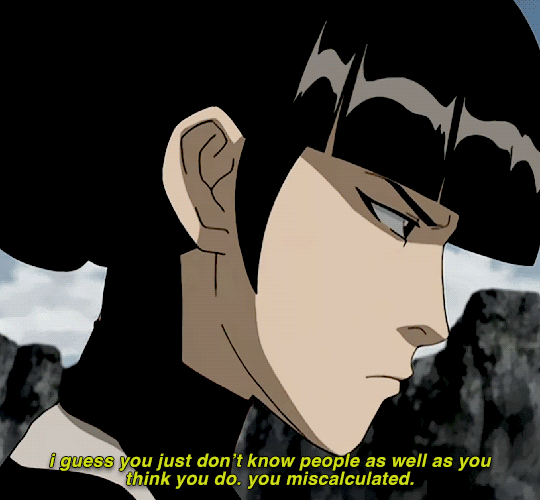
When Mai says “I guess you don’t know people as well as you think you do” this is already an insult. She’s putting down Azula’s intelligence and manipulation skills, things Azula clearly takes pride in. And yet despite how insulting that is, Azula still waits for Mai to explain herself. Even as Mai throws that barb at her, Azula wants to hear her out. Until Mai throws the even worse insult right at Azula’s weak point.
“I love Zuko more than I fear you” isn’t a statement of Mai being afraid really. It’s Mai throwing a powerful dig at Azula’s biggest fear and trauma, the one Azula tried to dismiss during The Beach with a joke to avoid showing her own vulnerability: Azula fears that Ursa hated and feared her but loved Zuko. It’s why during the mirror scene, a grief stricken and emotionally volatile Azula bitterly says to the hallucination of Ursa “even you fear me”.
Only then does Azula get triggered enough to lash out in return. Mai was only capable of hurting her so much precisely because Azula loves and trusts Mai so much, and precisely because Mai knew what to say to hurt her.
Even so, Azula does the forms for fire, not lightning. And after she is chi-blocked, Azula orders both Ty Lee and Mai jailed, not executed or banished despite having every right to do so since they just publicly committed treason against the Fire Nation.
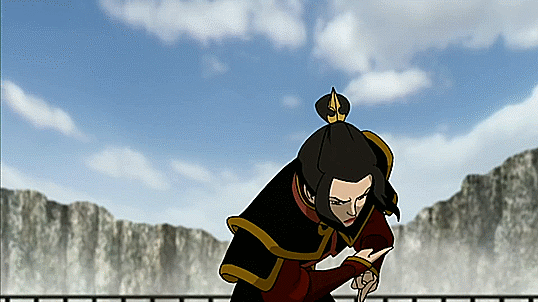
See the quick strike? It’s more like when she attacks Iroh in The Chase with blue fire:
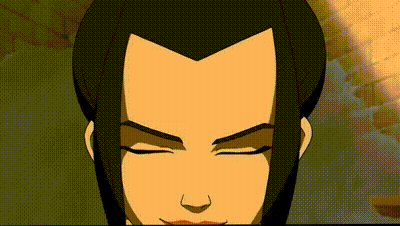
Lightning, by comparison, always has a wind up for her. Even when comet-boosted or otherwise.
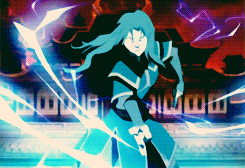
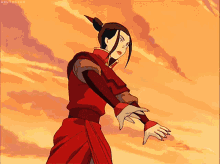
Remember Azula’s line we put a pin in? Let’s go back to it now. Why does Azula say “I never expected this from you” and “you of all people”. What is the significance here?
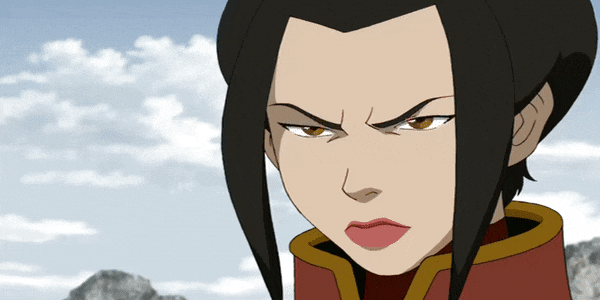
We know Azula is a perfectionist. She can’t stand a single hair out of place. This informs her frustration with Zuko and Ty Lee, both whom she adores, but whom are constantly failing to stay in their place and play their role. Zuko messes up, gets himself banished. Ty Lee runs away and joins the circus. What does Azula do? Endeavor to use any means necessary to bring them back into the fold. It sounds crazy, but from her perspective, she’s helping them shape up.
But Mai? She’s different. Mai knows her place. She knows what’s expected of her. She says herself that she learned to be quiet and still so as not to risk her dad’s political career. She hates it and searches for any excuse to leave her stifling expectations at home, but she only does this in an acceptable way: when ordered by the princess to join her on a mission for the Fire Nation.
This is why Azula is especially shocked. Because of all people, Azula thought Mai was the only one of her friends who understood their duty to the nation and wasn’t a colossal fuck up.
Azula may be more affectionate with Ty Lee, but she definitely respected Mai more.
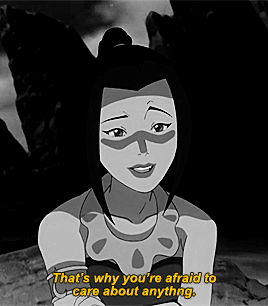
And I think the fandom doesn’t give their fascinating relationship or how it breaks down enough credit.
200 notes
·
View notes
Text
I'm seeing so much commentary on people reacting to the live action atla toning down Sokka's misogyny
and I'm over here like this is a total non-issue because in my own rewrite of the show I already did that exact thing, it makes complete sense to do it and they should do it because it's a weaker aspect of the original show
Sokka's early misogyny is utterly cartoonish in comparison to the set up of the rest of the SWT, it doesn't feel realistic for the only teenaged boy in a dying culture surrounded by adult women with a grandmother who left a more out and out misogynist society to act the way he does
how Sokka "resolves" his misogyny is equally cartoonish, I never liked how in The Warriors of Kyoshi literally episode 4 of the show makes a teen girl compromise her own culture with a female only fighting tradition teach a boy who is supremely rude and disrespectful to her and then still be attracted to him afterwards, it's more misogyny to fix misogyny and is very obviously men writing about how to fix misogyny especially as they have Aang make a joke about Sokka wearing a dress after going through how meaningful the fighting costume is and how a lot of Asian clothing with hanfu influences like atla borrows from would have men in what to western eyes would be dresses, Aang has already seen multiple male authority figures in robes, the joke makes no sense
I also wouldn't consider Sokka's misogyny genuinely resolved after this, consider how the show deals with his romantic relationships with both Yue and Suki and how both can be seen as extensions of how Kataang is treated in the show, rewards for the hero, especially with how Sokka interacts aggressively with Hahn instead of respecting Yue's wishes whatever her reasons for them, I think an argument can be made that Yue's death is a fridging for Sokka's storyline rather than or in combination with being a consequence of Aang's failure as an avatar or the culmination of her own storyline where she fulfills her duties as a leader to protect her own people
Beyond his romantic relationships, while Sokka drops a lot of his more misogynistic language with Katara, he doesn't support her when she faces off with the NWT leaders to learn waterbending, and he still leaves the caretaking and food preparation and grocery shopping to her which is more common than him going out to hunt or gather in order to provide for the group while he takes a leadership role like determining their travel schedule and routes, it is not an even division of labor and falls along traditional sex stereotypes
In addition to his typical duties to the group, Sokka also remains invested in the trappings of masculinity after ep4, he's concerned about what's manly and how he compares to Jet for example, there's no investigation or interrogation in his interest in meat and hunting and how they relate to masculinity and his misogyny, in the episode with Piando, his insecurity as a non-bender is resolved by giving him a new male mentor and a new martial skill, sword fighting, which is masculine in both western and Asian cultures rather than assuaging his self esteem issues in any less stereotypically masculine ways, I also think it was done so he could compare more favorably to Zuko, another male character, and even his interest in engineering and mechanics comes with a male mentor and is a traditionally masculine pursuit
the show's poor handling of misogyny also extends beyond Sokka, with the NWT, the show acts as if Pakku is the only reason the tribe is misogynistic and the only consequences to that misogyny is that women can't waterbend and there are arranged marriages, and that both the NWT and Pakku's misogyny is resolved by allowing only Katara to learn to waterbend which she doesn't even earn on her own merits, she gets the opportunity because Pakku likes her grandmother
none of this is realistic, misogyny is not because of one bad apple, Pakku doesn't make Yue's arranged marriage, Chief Arnook does, he picked Hahn for her, and the show acts as if Arnook has no authority to compel Pakku to teach Katara or any ability to persuade him in order to reduce his culpability in the NWT's misogyny as its leader to make him a more respectable character so it's not uncomfortable when Aang and Sokka follow his orders in the battle later on, but women not being able to bend and forced into arranged marriages is still status quo when the gaang leaves, Yue's just dead
I'm not even convinced the show runners understand what's wrong with arranged marriage, the issue is not Yue can't be with Sokka who she likes and at most has a slight crush on cuz she's only known him for like two days, it's that she's being treated as male property, a broodmare, and a vehicle to ensure Hahn receives the throne because her father has no male heir and picked some guy to succeed him instead, like it's not explicit in the show but that is the implication based on the historical reality of princesses in arranged marriages, and the show has her get out of it only through death idc that she ascends to being a spirit, it's still a teen girl that dies
There's also no discussion by the show of the Earth Kingdom's misogyny when it has the exact same shit going on, Toph is the only female earthbender in the show not including avatars, there might have been a female earthbender in the background when Katara broke them out of prison, but I'm not really counting that, the entire army and Dai Li are all made up of men, the EK might even be worse because the show doesn't demonstrate that women and girls even have the capacity to earthbend aside from Toph and avatars and Toph doesn't even learn from a human, she has to learn from animals, the show treats this as commentary on her disability but the show has no compelling reason why it can't also be commentary on her sex, Toph was also originally supposed to be a boy so this could have ended up so much worse there literally would have been no female earthbenders aside from avatars at all, I'm not counting Oma as she might just be a mythological figure not a real person that once lived
The Fire Nation kinda barely avoids the same issue, Azula is the only named female firebender aside from avatars in the show but she has two female sidekicks who despite being non-benders show martial skill and there are clearly female soldiers and guards in the FN military so there are much stronger implications of female firebenders existing and being completely allowed to train their abilities and that Azula isn't exceptional in that respect like Toph is, only for being a prodigy with blue fire
Azula was also originally supposed to have an arranged marriage in s3 and they dropped it in favor of showing that royal and noble girls could casually date in the FN which has wild implications for women's empowerment in the country more so than but especially in combination with the fact women can train and join the military (which is why I say the FN is not fascist it's literally the least misogynistic country aside from Kyoshi and by like a country mile so it's literally not misogynistic enough) not that the show does anything more than minor teen drama with it
again, the vast majority of this misogyny is completely unremarked upon by the show especially after s1 when they leave the NWT, it is clearly a fictional world made by men with no true understanding of misogyny just a vague awareness that misogyny is bad and what the really obvious and outdated examples of it are, this is a narrative inconsistency in the show to have the examples and commentary on misogyny be so cartoonish in the beginning and then disappear after s1
your options to resolve this inconsistency is to either go all in with more realistic misogyny and provide commentary on all of it but this takes effort and will be divisive, or take the easier route and ease off the cartoonish-ness of it and comment less on it to avoid drawing attention to all instances of misogyny in the show
obviously Netflix was gonna do the latter
(not me tho, I'm making it less cartoony and dealing with it in my rewrite)
#atla#live action atla#atla critical#anti bryke#anti kataang#anti sokka#its not really anti him more anti how his character was written and dealt with#long post#meta
386 notes
·
View notes
Note
what do you think of the argument some people make that goes along the lines of "zuko was acting entitled towards kataras forgiveness and the betrayal at the catacombs was just a second thought to him"? According to them, zuko failed to understand that kataras anger at him was a direct consequence of his previous decisions and instead blames it on her resentment against the fire nation (the whole "i think she sees me as her mother's murderer" spiel). They also claim that he's a raging misogynist bc of the way he treated katara in the pirate episode, that he didnt remember her name when asking sokka abt the southern raiders, taunting her in the northern tribe by saying she is a big girl now that she's learned some new tricks, referring to the kyoshi warriors as a "bunch of little girls", yelling at mai and acting possessively, mocking ty lee... amidst many other things, including the toxic masculinity accusations ofc. They also condemn his selfishness in helping katara find some semblance of closure. I think a great part of this is just biased hate, but i just wanted to know your opinion. It's okay if you don't want to answer though!
Oh no of course, I think it’s definitely biased hate, because these kinds of superficial “criticisms” only seem to come up in response to people shipping Zuko with the incorrect character. I’ve seen the same people who make these arguments praise Zuko, say they love him, say his redemption is inspiring, etc. in other contexts.
There is a lot to unpack here, but I’ll touch on all these points because I find them interesting. Also, in regards to generally stupid anti Zuko takes from whiny anti shippers, a lot of those came up here which I addressed in detail.
Now, about these particular arguments.
1) Zuko wanted Katara’s forgiveness out of selfishness
Firstly, I never understood this take because in context…Zuko already has what he set out to get when he left the Fire Nation at the beginning of The Southern Raiders. Actually, let’s take a step back here: leaving the Fire Nation. Did these people collectively forget that? Zuko could have stayed in his life of luxury, watched the world burn, and inherited the title of Emperor from his father. But instead, he committed treason, risking his life in the process, because he knew in his heart it was the right thing to do. This is the character you’re trying to smear as a selfish monster?
Anyways.
The Southern Raiders. The scene which kicks off the conflict with Katara is when the group is sitting around the fire, praising Zuko for his heroism and saving them from Azula. He humbly admits he doesn’t feel he deserves the praise, to which Katara agrees and storms off. But the important piece of context here is that everyone else—including Sokka, Katara’s own brother—seems to be on Zuko’s side. If Zuko was purely selfish, he wouldn’t have cared what Katara thought of him. He could have laughed along with Sokka and agreed that Katara was just being dramatic. But that isn’t what happened.
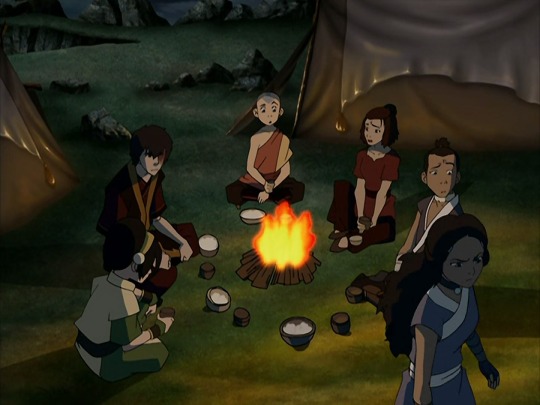
Zuko doesn’t look angry or vindictive here; he looks hurt. He cares what Katara thinks of him; he later says those words verbatim to Sokka.
I also think the fact that Zuko made a special effort to reach out to Katara above the other characters shows that he recognizes that the catacombs incident was much more personal for Katara. Zuko even acknowledges this himself.
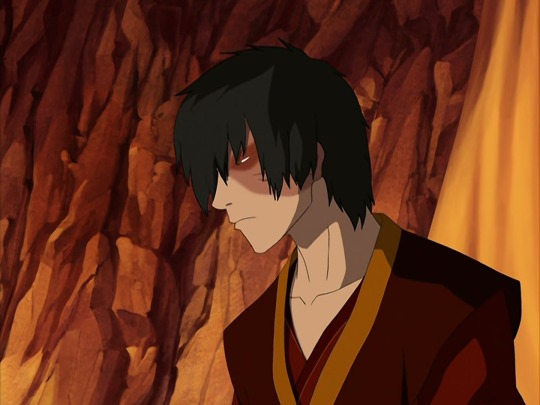
Zuko: Katara mentioned it before when we were imprisoned together in Ba Sing Se, and again just now when she was yelling at me. I think somehow she's connected her anger at that to her anger at me.
Zuko remembers their conversation very well. Katara’s anger towards him was different than the others because she felt betrayed on a more personal level. She shared something deeply personal with Zuko and connected with him, and felt deceived when he betrayed her.
In Katara’s mind, Zuko talking about his mother was fake. She tells herself it was just him lying to her and manipulating her to gain her trust, because that’s easier than the idea that he didn’t care. I believe this is why Zuko finds it so important to make it up to her…and specifically why her mother was involved. Obviously Zuko was wrong to side with Azula. But he wasn’t being manipulative or uncaring. He was manipulated himself by Azula, the person who knows how to control him better than anyone else.
So, in this episode, Zuko is not setting out to prove that he’s “good” (he’s already done this); he’s setting out to show Katara that he does respect her trauma, he does understand and respect the weight of what she told him about her mother. Zuko can tell she’s deeply hurt and that he’s part of that hurt. That’s why he wants to demonstrate that his care for her was and is genuine. He never lied to her. And that right there is the opposite of selfishness. This is once again Zuko acknowledging his own faults and taking responsibility for fixing them. He doesn’t even seem to demand or expect forgiveness in the end.
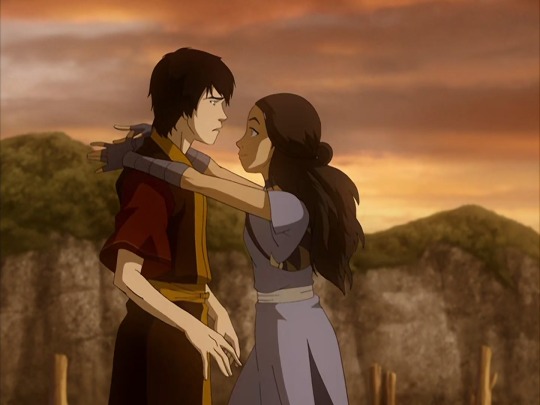
Look at his face. He’s surprised. He did not expect this gesture, although he graciously accepts it.
If Zuko was this selfish, entitled monster people want him to be, he wouldn’t react this way. He wouldn’t even care about any of the points I just went through.
If you honestly believe that Zuko’s motivation was selfish and he was just manipulating Katara’s feelings this whole time, you fundamentally missed the point of one of the show’s most critically acclaimed episodes.
2) Zuko didn’t know Katara’s name (?)
This one is just stupid. I’m sorry. I didn’t know people actually used this argument because it originated as a joke post and you should be embarrassed if you genuinely think this is canon. It comes from the scene in The Southern Raiders where Zuko says “your sister” rather than “Katara” when asking Sokka about their mother.
There is absolutely nothing about this scene indicating that Zuko doesn’t know Katara’s name. The word choice is most likely to emphasize the sibling relationship between Katara and Sokka to explain both to Sokka and to the audience why Zuko sought him out specifically.
And think about it. Zuko has been hanging around 24/7 with them for probably two weeks at this point. There is no way he didn’t catch Katara’s name, if he didn’t already know it. And given how diligent he was in his Avatar hunting days, he most likely did already know it.
3) The pirate episode
Okay I’ve said this before and I’ll say it again…I’m so tired of people projecting some weird, creepy sexual undertones onto this episode. There was absolutely nothing abusive or misogynistic about the character interactions here. It was a very standard (and honestly a bit cheesy) example of a cartoon villain and hero interaction. The fact that you see a female character in any kind of distressed situation and immediately project sexual implications onto it is the real misogyny here. I never see people complain about similar scenes involving male characters:

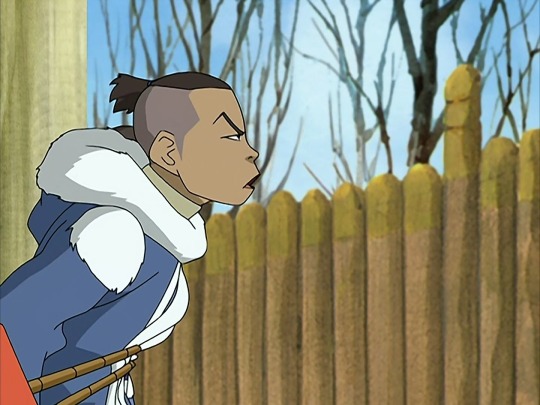
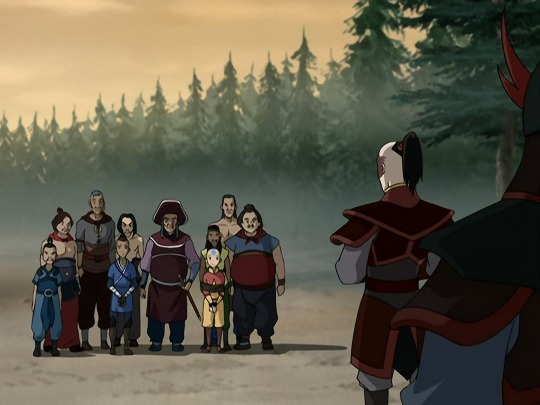
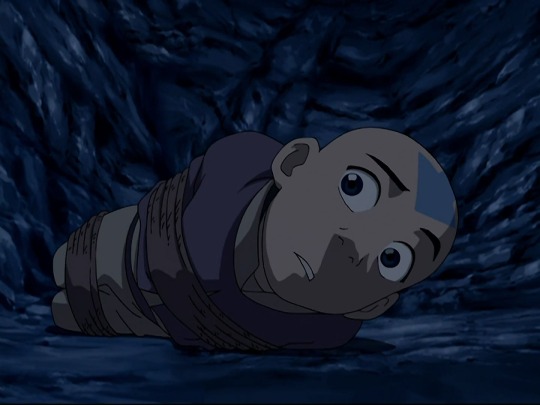
I could dig up even more examples but can you see my point? The argument that there was any abuse or sexual misconduct on Zuko’s part this episode is absolutely misogyny—but it’s audience misogyny; not Zuko’s. The canon scene would have gone exactly the same way if Katara was male. The only difference would be much fewer disgusting sexual over-analyzations of it by fans.
4) “Little girls”
For this one, an important piece of context to keep in mind is that this script was written in 2005 by a creative staff of mostly men. So we need to ask the question, is this meant to reflect misogyny on Zuko’s part, it is it the bias of the writers?
Another prime example of this is Iroh’s interactions with Jun. Obviously, that was severely creepy behavior and absolutely misogynistic. However, most fans (including myself) tend to overlook that. Why? Because it’s jarringly inconsistent with the rest of Iroh’s character and his purpose within the narrative. In context, it’s pretty obviously something the writers thought was “funny” at the time but aged like rotten milk.
Also, in regards to sexist language during fights, consider all the stupid lines like…
Azula: Who are you? The Avatar’s fan girls?
Ty Lee: You are not prettier than we are.
…in the Kyoshi Warriors vs. Dangerous Ladies fight. Seems like this is just a writer bias issue, personally. When have men ever been normal about teenage girls? Right—never.
I get this is a slippery slope, so my approach is to compare Zuko’s lines like this to everything else we know about Zuko and ask the question: is there anything about Zuko’s character that indicates he views women as inherently inferior or lesser?
Well, no.
You know what is a trend for Zuko? He focuses on putting down his opponents by acting like they’re younger and weaker than him. His first reaction to Aang is “you’re just a child.” This is consistent with his attitude towards Katara and the Kyoshi Warriors. Zuko canonically treats male and female opponents no differently. He fights and moves on. No creepiness, nothing like Iroh and Jun, etc. If they were male, it wouldn’t have gone differently. That’s why I think it’s a reach to say these comments by themselves indicate a misogynistic attitude.
Besides, why would Zuko see women as weaker and lesser when this is who he grew up with?
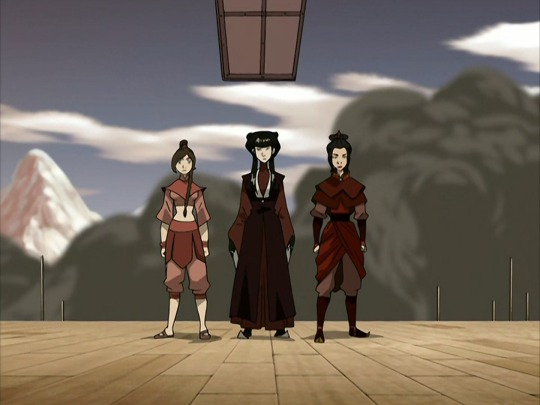
That’s another thing. For as much anger and resentment Zuko harbors for Azula on the basis that she’s Ozai’s favorite and born lucky—not one comment is made about her sex. If Azula was male, nothing would inherently change about this dynamic. So yeah, I’m not really buying this whole “Zuko is a misogynistic incel” narrative. If you’ve ever dealt with incels in any capacity, you know they’d absolutely jump at the opportunity to whine that their (female) sister is so much more lucky and privileged and loved compared to them.
5) Zuko, Mai, and The Beach
I’m working on a longer analysis of this but to summarize…people on both sides blow this issue way out of proportion. Mai wasn’t abusive. Zuko wasn’t abusive. They were a pretty standard angsty teenage couple having angsty teenage drama. Zuko called Mai a big blah and shoved some dude into a vase. Mai told him he was out of control. That’s literally such a minor issue, that they resolved by the end of the episode.
But to dig into this more, consider the point this is in Zuko’s story. He’s at rock bottom. The premise of the entire episode is to show how abnormal and out of place Zuko feels among people who should be his peers. His issues with Ruon-Jian aren’t even about Mai to start. Zuko was beefing with this dude before the party even started, remember?
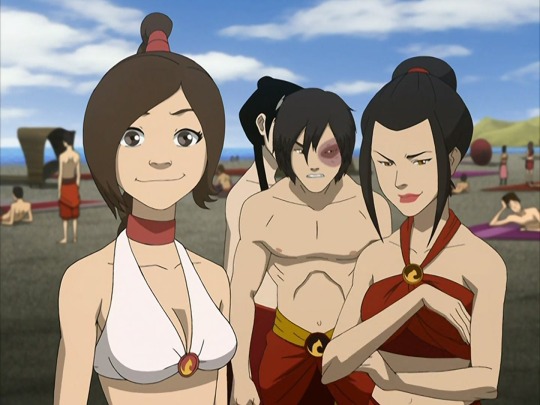
Why is Zuko mad at him? Because he’s making Zuko feel freakish. He’s making Zuko feel like he once again is an outcast, and Zuko hates that. He’s insecure. That’s…the point of the episode.
I’m not going to excuse his tantrum over Ruon-Jian talking to Mai, because that was toxic, but consider the context. Zuko isn’t some crazy possessive freak. In his mind, this is just icing on the cake, another example of why he’s an antisocial freak compared to other Fire Nation teens and he hates how it makes him feel.
But interestingly enough, I do think Mai and Zuko’s interactions in that scene give some insight into their dynamic and Zuko’s character—believe it or not, in a positive way. Just consider the context and body language.
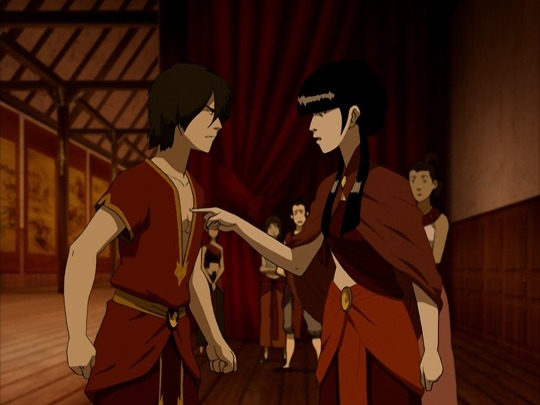
I’m just stating facts here. Zuko is more physically threatening than Mai. He’s bigger, stronger, male, and he’s a firebender while she isn’t a bender. And yet, Mai has absolutely no trouble getting in his business to tell him off. Why? You can argue that it’s just because she thinks she could knife him—but we’ve seen how she reacts to an actual physical threat (Azula) and it isn’t like this at all. Mai is confident because she knows Zuko wouldn’t physically harm her. He’s angry, but he never once uses his figure to physically intimidate her. He clearly doesn’t make a habit of this behavior either judging from Mai’s reaction. Also think about the fact that the only physical altercation here is between Zuko and another man. The primary target of his anger isn’t the woman he’s allegedly acting possessive over unlike another character in the Ember Island Players and several comics…
Not to mention the way they reconcile around the fire. Zuko’s behavior doesn’t at all reflect an angry, entitled misogynist who thinks he owns his girlfriend. Quite the opposite. He clearly holds a lot of love and respect for her. It’s just that…this episode is literally displaying Zuko at his most tortured, his most self-hating, his most insecure as he realizes he no longer has a place in the home he’d desperately been chasing for years after being brutally mutilated and banished. With that in mind, I think he actually handled himself very well.
The thing about Zuko is that he takes accountability for his wrongs and works to improve himself. He has flaws and even when they’re understandable, he still takes responsibility for fixing them. That’s the trait of his that sets him apart from…certain other characters.
6) Zuko being rude to Ty Lee
Again, see above. Yes, Zuko was mean to her. But again, this is Zuko at rock bottom. This is Zuko venting his frustration about nobody being able to understand what he’s gone through and how isolated and freakish he feels. None of them had their faces burnt off in front of an audience. None of them were banished and forced to live as refugees. Zuko blew up at Ty Lee in the first place after she made a comment about bad skin.
Like yes, he’s rude, but did you miss the point of that episode? If you think this has anything to do with misogyny you’re just delusional, sorry. That interaction had nothing to do with Ty Lee being female. It had to do with her (and every other character that episode) living a privileged lifestyle while Zuko is (literally, too) feeling the weight of the scars his trauma has left him with.
So in conclusion, yes, I really think these takes are all shallow and unfounded jabs at Zuko’s character that either don’t understand or outright ignore critical parts of his development and story. And considering I’m #canceled for my based misandry in many circles, it should say a lot that I’m defending a man of any kind ✌️
#zuko#mai#zutara#maiko#atla#zuko defense squad#aang critical#canon critical#the beach#the southern raiders#ask#anon#meta
53 notes
·
View notes
Text
Context for choices 1, 2 and 9
My little au on if Aang never left
For my Zuko/Azula as prodigies. Basically they are both naturally gifted Firebenders. Zuko faces Ozai in combat, but Zuko faces Ozai. As Ozai is about to finish Zuko, Zuko hits Ozai with white flame and then Ozai declares Zuko the victory and he gains his father's respect.
Eventually Zuko and Azula are at a sibling rivalry, trying to outdo each other and even trying to kill each other for their father's approval and to win the throne. Ozai puts their ambitions to the test. Whomever captures Ba Sing Sei, Northern Water Tribes and the Avatar first becomes Ozai's successor.
This video better explains it
youtube
Asami as Amon
Asami witnessed the brutal murder of her mother, but it wouldn't be by just any benders. It would be the Red Lotus Society.
Zaheer planned to finish the job, but Toph came to the rescue.
the spirits would take pity on Asami and gift her energy bending and Asami would use her father's wealth to master Chi-Blocking and use their wealth to fund and arm the Equalists.
Amon or in this case Asami wins at the end of Book 1. Tarrlok is still captured by Amon, when Korra sees him and they chat, he tells the whole story of Amon as it happened in the show to her and everything. Like it goes in the show. Korra and friends go to confront Amon at the arena where Tenzin and his family are about to lose their bending. But they don’t because she gets there in time. She accuses Amon of being a bender, as per Tarrlok’s story. Amon doesn’t unmask. And he isn’t a bender. Tarrlok lied to get Korra to confront Amon so that he could capture her and he could hopefully save his own skin for the service at least. They fight. Amon takes Korra’s bending in a big demonstrative way. So all the crowd can see what comes to any benders, especially The Avatar who stand against him. Then the reveal happens. Asami is Amon.

Art by nikoniko_808
In order to get her bending back and learn how to give others their bending back (yeah, Korra wouldn’t get it back at the end of Book 1 because consequences? What’re those?), Korra has to go on a quest to learn her bending(her masters would be Toph, Katara, Izumi and Tenzin) in the Spirit World to understand everything. Korra does not cry about loosing her bending because she realized she’s still The Avatar and has to go to The Spirit World to get her bending back, to help everyone get their bending back and stop Asami
Throughout the series, we would meet Kya, Bumi, Izumi, Eska, Desna(Eska and Desna would be Korra’s siblings in this universe, because fuck Unaloq) Opal and Kai. We have the same romance between Bolin and Opal and Jinora and Kai. We would also meet Varrick and Zhu Li, because they are comedy gold. They would all help in the fight against Amon and the Equalists.
In Korra's venture to the Spirit World,
she would still see Wan’s story(because that’s the only thing I liked about Book 2) and I think in her journey in the spirit world she would see Asami’s story, in which her family were victims of the Red Lotus society and Asami learned to take bending away in the spirit world. Not only that, we would find out that Asami would be bonded with Vaatu. Asami is the darker Avatar.
Before she leaves The Spirit World she connects with all her past lives to ask what she should do about Asami. Korra has her Aang moment where she has too has to decide what to do like he did with the fire lord, only this time there's more to it than just stopping the bad guy. It’s about the person she loved. She can restore everyone’s bending by reversing Amon’s convergence, but she can't do that so long as the avatar spirit is split. And as long as Asami is part avatar, she can go into the avatar state. That's still pretty damn dangerous even with only water and blood bending. Korra realizes the only thing she can do to stop Asami? Love her.
After her journey to relearn her bending and journey in the spirit world, Korra travels the world to gain allies. From the Fire Nation, Earth Kingdom, Water Tribes and Air Nomads. Korra unites the world against Amon and the Equalists.
In the final fight, Korra defeats Amon. She exorcises Vaatu from Asami, thus ending the dark Avatar and stopping Amon’s convergence. She reverses what Asami has done and uses it to restore everyone’s bending. So she has to come to the hard part. Amon makes it clear, no matter what, even without the ability to energy bend or without Vaatu, Amon will never stop, Benders will never be safe. Korra shows Asami what she was denied. Korra loves her and forgives her. Asami gives up and accepts whatever punishment.
During Book 3, Asami would work with Korra in stopping and killing the Red Lotus society. However, when Zaheer is stopped. He is left at the mercy of Asami and for everything he’s done and turned her into. Asami kills him.
Book 4 happens. Asami's redemption is rebuilding Republic City and using Future Industries to repair the damage she's done as Amon. Blah blah blah Korra stops Kubira blah blah. Asami earns her redemption and the love of the krew and more importantly Korra. Ends with Korra and Asami venturing in the Spirit World and ends with a kiss.
#Avatar The Last Airbender#Legend Of Korra#Aang#Zuko#Azula#Lu Ten#Iroh#Jet ATLA#Katara#Zutara#Taang#Korrasami#Korra#Asami Sato#Amon#Suki#Tahno#General Iroh#Youtube
75 notes
·
View notes
Text
Things that natla did do:
- Katara stealing a water pouch from a merchant shop at night
- zuko draws!
- include pieces from the books and comics (mother of faces, Kyoshi‘s personality,
- „water the most promising seed“
- Katara standing by and smirking as Sokka flounders trying to impress Suki but her not buying any of it
- Katara never letting anyone talk over her once diplomacy fails
- Bumi‘s armpit hair
- Zuko talking about Lu Ten
- Azula learning to use a blue flame and failing
- what can I say, the actors make the show very enjoyable 🤷🏼♀️
- Kuruk refusing to take possession over Aang‘s body/ Avatar state
- overall I think they drew info from the books about the other eras
- the sound of Iroh‘s firebending reminding of a dragon‘s growl
- Avatar Roku making fun of Avatar Kyoshi
- Zuko basically enthusing about Kyoshi‘s strength only to then get his ass kicked by her
- Suki (and mom) gushing over seeing their role model Kyoshi in action
- random woman with broom and Zuko letting her hit him
- Aang running away at the end, after the battle. He might not have run from his responsibility but he ran from the consequences
- „have you seen my flying bison?“ which is way better because even less believable
- Katara being bold enough to train her waterbending in the abandoned fire navy ship around Wolf Cove
- emphasis on Sokka‘s inventory skills and by elongation his bad ice dodging skills
- Zuko deciding to stay with/ look for Iroh instead of chasing Aang twice
- Lu Ten‘s theme playing every time Zuko and Iroh confess their love for each other
- Omashu‘s part of the earth kingdom being India coded
- Zuko so specifically being triggered by the word „compassion“ but not „empathy/ emphatic“ because he actually does believe in kindness and much like Azula is still trapped in the pressure of having to represent all his father believes
- Zuko looking disgusted all the time
- 41st division bowing to their prince
- I had fun watching it and most of it makes sense tbh.
What I don’t get (logic mistakes):
- Mai being too openly anti fire nation by saying she wouldn’t ever come back if given the chance
- Iroh finding the Blue Spirit‘s mask in Zuko‘s pile of clothes but maybe that’s not even a negative.
- no talk about the meaning of the necklace
- Gyatso Living in the Spirit World (doesn’t Aang have enough guides with all his previous lives?);
- that assassination attempt on Ozai and Azula infiltrating the plan? Was this meant to show Ozai‘s cruelty and Azula‘s strategic thinking??
- what was Bumi‘s point exactly?
- Yue being a spirit fox. Why? It added nothing.
- „i bet you taste like chicken“ no opossum chicken. just chicken.
- Kyoshi being the narrator
- Aang being able to communicate with his past lives only by visiting their shrines and not in the right order (usually the avatar has to contact every avatar before him in the order of their lifetimes before he can get through to the next)
- Aang being shamed and gaslight by everyone
- confusion over what happened to the villagers as well as Katara and Solla by mixing Hei Bai‘s and Ko‘s stories as well as the Fog of Lost Souls and creating a new loophole into the spirit world when people stand too close to Aang while he meditates? Also, Ko‘s „Magic“ with individuality and his reason for stealing faces when showing emotion is lost.
- with all due love, what was Suki‘s mother for?
- Wan Shi Tong randomly sitting at some wayside
- Why wouldn’t normal people understand Wan Shi Tong? How are they planning for Team Avatar to find out about the solar eclipse if not through Wan Shi Tong‘s library later?
- Iroh suspecting Ozai behind the apparent assassination of Zuko so openly in front of Zhao
- Iroh justifying his war crimes with „I was a soldier“??
- Iroh „sacrificing“ himself in Omashu when the earth kingdom forces were looking for the firebender even though they both would’ve gone undetected otherwise
- Iroh killing Zhao
- does Momo carry the spirits‘ life now?
- the fire nation inventing a solar system model to predict Zosin‘s Comet and potentially the eclipse as well
#avatar#atla#atla la#natla#natla spoilers#natla positivity#i actually like this#netflix#i agree with the criticism tho#avatar the last airbender#zuko#uncle iroh#kyoshi#katara#the effects were decent
68 notes
·
View notes
Text
One of my most reblogged posts says, “ ATLA asks whether you can actually be friends across these lines if society refuses to be equitable. Friendships and romance depend not on conflict to deepen them but an active peacefulness.” I think a lot of people relate to the post’s critique of the kyriarchy (all those damn interwoven -isms!) and the ways it limits the formation of relationships. It describes how violence shortens lifespans, squashes nuance, and forces people together into exploitative rather than mutual dynamics. It’s easy to read my post as condemning the possibility of real connection across lines of oppression. I think that’s what I believed when I wrote it even. I’ve always had a certain gifted grace when I reread my writing, however, to discover that I’ve left a window of opportunity open. In this case, the window is within a few words in those sentences: “ATLA asks whether you can,” and that word, “active.”

The show doesn’t merely ask, but it answers its questions with that concept of active peacefulness. Wtf does that mean, tho??? Our boi Aang is so notably avoidant as to be a stereotype of his culture within universe. If it were up to him alone at the start of the show, peace would be a completely passive state. But if that were the case, he’d still be in the big ol’ ice cube. It’s Katara and Sokka’s dynamic and conflicted communalism that frees the avatar unto the world again. Katara demonstrates how disagreement and rage need have nadda to do with assault or abandonment. They can be the features of closeness and trust within a healthy growing relationship, peaceful even as they exact major shifts in the world. Sokka’s misogyny isn’t anything to imitate, but its the first instance we see in the series of a relationship strong enough to accept critique, discourse, and change. Just in this first episode, Sokka illustrates receptivity, Katara models productive and honest emotion, and, soon enough, Aang is introduced to spur on the expansion of these healthy communal practices beyond imposed borders, with all of them learning and growing in relation to one another.
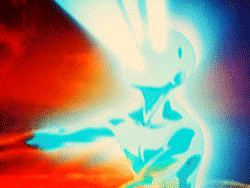
This has profound implications for what comes in the finale regarding Azula and Ozai. These two powerhouses depended on order to stabilize their relationships rather than the bitchy discursiveness that constitutes real friendships or the meaningful arguments and compromises that make for a healthy romance. Importantly, neither gets the comeuppance they’d prefer: domination. Instead, they’re forced into relational dynamics. Azula is frozen alongside Katara, while Ozai’s energy is melded with Aang’s. If they are bested, it’s not in the arena of power; it’s in mutuality. They’re forced to be closer to the people they’ve oppressed and abused, held together rather than apart, and they come out of that encounter cowed but uninjured, the way a friend’s censure pains a soul so much worse than an enemy’s assault that cripples or kills. And the show’s not idealistic about the consequences of these symbolic gestures. It imprisons the antagonists, who are still not friends or even allies--only horrific equals who have a long way to go before any kind of trust is possible.
One person knows that long road, though. Zuko. His relationship to the gaang, and most of all Aang, reveals best that friendships across the constructed lines of oppression are possible and, in fact, a model for the most transformative relational dynamics. I’ve gotta block quote Ramzi Fawaz’s shit on friendship in Queer Forms, cuz it’s game-changing in concepts of friendship, and subsequently, why we feel so delightfully charged by Zuko’s ‘redemption,’ as its been called.
Friendships of the kind I am describing, then, ones that carry the spirit of inventiveness and experimentation described by [Audre] Lorde and [Michel] Foucault, are exceptionally capable of handling conflict, because a genuine equality between the parties (that is nothing like sameness but has to do with two people equally valuing one another) means that both are actively engaged in the construction of the bond. This is why friendship can never function as the application of a rule (you must care for me in this predetermined way as a condition of our speaking) but rather takes shape in the doing of it, as the mutual creation, and continual renegotiation, of shared criteria for dialogue (we will speak, again and again, in order to figure out what conditions best enable our mutual growth). This model of sociality leaves far less space for victims and perpetrators, accusers and accused, because of a sense of mutual involvement, a complicity of the best kind not unlike Lorde’s conception of ‘the erotic’ as a force that animates a shared creation or ‘invention’ of new social forms between two people. It is also a description of the kind of interaction that incites people to change, to relase destructive or oppressive logics like homophobia, sexism, transphobia, and racism, not under ideological duress, shame, or demand, but in the surprising encounter with others who shift the ground beneath one’s feet.
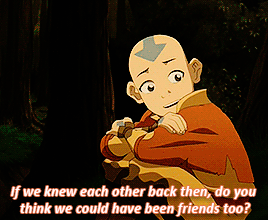
We can see these kind of steadfast and contentious dynamics with lots of pairings as they develop on the show : Toph and Katara, Suki and Sokka, Aang and Teo, Katara and Aang, Mai and Zuko. These relationships go beyond simple alliance. While the empire’s violence might force these people together or apart, its their own abilities to face their differences, stick it out, and build something mutually beneficial (rather than the easier option of antagonistic) that connotes these relationships, even as it forces them to vacate the ideologies they held at the beginning of each episode in order to create more expansive visions of understanding. Zuko’s arc, of course, is the clearest answer atla offers: he goes from a villanous relationship, to a stance of confusion, toward a final state of loyalty and dedicated friendship.
Relationships are possible within the sphere of violence and across the hierarchical lines the violence has implemented and enforces. Those people in positions of power, upheld by the violence and neglect of others, are actually equals (in the existential sense) to the most marginalized individual, and are therefore capable of all those tenets of humanity--embarrassment, sensitivity, loneliness, evil, empathy, etc. It’s only that the domain of oppressive conflict makes the tensions, betrayals, and metamorphoses that are a necessary part of the best kinds of friendships terrifying because those experiences feel so similar to abuse. In abuse, though, only one person is forced to change. In a reciprocal relationship, everyone is surprised to find they’re not entirely offended that someone else finds them imperfect--and somehow that’s endearing and engenders changes that neither person necessarily even demands. This is active peace: joking, judging, hugging, arguing, confessing, bitching, breaking rules, trusting, dancing, loving within a deeply imperfect world with deeply imperfect people for whom you, nevertheless, still want the best and who seem to want the best for you (which is why you wanted the world to change for the better in the first place).
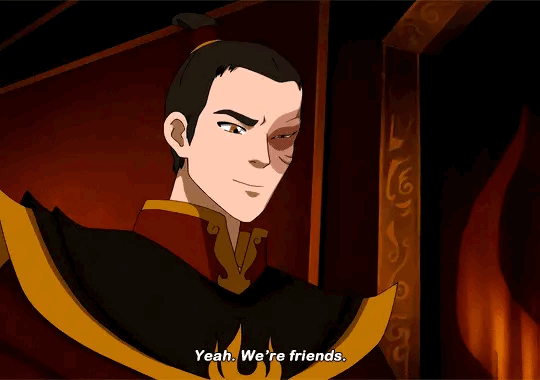
#Platonic love#atla meta#friendship#zuko#aang#queer platonic love#zukaang#aanglove#katara#sokka#atla
239 notes
·
View notes
Text
I was thinking about Zukka the other day (as one does) (and then tumblr erased my draft), and how I think they'd be able to heal each other, in ways that no one else in the gaang would really understand.
Because like, they've both been through a lot of trauma, and after that trauma they both became "stronger", became able to protect themselves and others, etc, right?
But they both view the trauma and it's consequences in very different lights: Zuko clings to his pain and suffering as if they were teachers, as if he is his trauma and only became stronger because those things happened to him. Meanwhile, Sokka knows that's not who he is, that he had no choice but to become a protector, but he still chooses to rise up to the occasion and use the trauma and the pain to his advantage (even if it's not exactly healthy).
The thing is tho: Zuko learned how to let go, how to find strength in healing, even if he still thinks the anger, pain and suffering are a part of who he is. A "bad" part, sure, but still him. Sokka never learned how to let it go, he continues to choose to rise to the occasion, because he still believes he has to. He knows it's not who he is, but he can't help it if it needs to be done, right?
So I think given time (and peace) they'd really be able to help the other grow. Sokka by helping Zuko understand that he is not his trauma, and Zuko by helping Sokka let go of the self-destructive patterns he still clings to.
Slowly but surely, they'd heal together.
#then they fall in love#and kiss#cuz why not#atla#atla best show#avatar the last airbender#atla zukka#zukka#atla zuko#prince zuko#zuko#sokka atla#sokka/zuko#atla sokka#sokka#headcanon#healing#avatar aang#fire lord zuko#post canon
52 notes
·
View notes
Text
“if my father thinks the rest of the world will follow him willingly, then he is a fool.”
i find this line (this whole interaction, really) interesting for a few different reasons. i’ve seen it said that this seems like a weird moment for zuko, who we’ll come to learn is desperately trying to earn his father’s approval, love, and acceptance, to be so combative about his father’s plan and to say something so critical here, but i actually don’t see it as very contradictory. for one thing, his father isn’t here, and while zhao is acting as an extension of ozai of sorts, and there is risk involved in saying something like this to someone who clearly outranks zuko in status due to his banishment, there is a difference in how one might talk ABOUT their abuser to someone else vs. how they’d talK TO their actual abuser. (it’s noteworthy, too, that zhao’s response is only a snide, derisive comment, not even a threat to tell ozai what zuko’s said, because he sees zuko’s opinion (and, well, existence) as mattering so little it wouldn’t be worth the time it’d take.) also, abused children are notoriously, harmfully adept at cognitive dissonance. zuko thinking his father’s war plans are bad doesn’t change that he wants his father’s love and respect (though it is an early sign of the differences between them, and a subtle acknowledgment that zuko doesn’t actually see his father as a good leader.)
also, though, i think that it demonstrates a clear defining trait that’s been there since zuko’s childhood: he often cannot bite his tongue when he has Thoughts (TM), even when it’d be much safer for him to do so.
“i see two years at sea have done little to temper your tongue.”
this is obviously a reference to zuko speaking out at the war meeting, but my interpretation is that zuko, at least to some degree, has always been like that. the war meeting was the first time it had such severe consequences because of the context, but he’s always struggled with the kind of tight-lipped demeanor he was supposed to display. he wasn’t ever trying to be disobedient, and a lot of the time it probably just slipped out, but i think it’s fundamentally another way in which he cannot conform to the standards set for him.
(it’s also one of the (many, many) reasons he’s so miserable when he goes back home in book three. he’s finally figured out how to conform to these expectations. he chooses his words carefully as ozai reveals the lie azula told. he’s “the perfect prince” at the meeting, and even when he starts to express doubts—“that’s not exactly what i…”—azula interrupts and he pulls himself back. but he hates it. he’s ashamed of it. because as he’ll tell mai at the end of that episode, he wasn’t being true to who he is.)
25 notes
·
View notes
Note
Hi,
Hope you are doing well.
Thank you for the last response on Zuko.
I was reading the post you rebloged regarding Aang and Zuko as parallels, and that got me thinking about the conflicts between Zuko and Katara, and Aang and Katara.
The fact that in the conflicts between Aang and Katara, it doesn't seem like Aang gets to face consequences of his actions in the conflicts, it seems like he gets off scot-free, which makes it look like the argument was given no resolution and forgotten.
I would like your thoughts on this.
It really does seem like Aang's internal conflict with accepting his duty as Avatar vs his want to be with Katara was meant to be a parallel to Zuko's internal conflict, but the writers dropped the ball because of the common phenomenon of being too invested in their hero and not letting them be flawed.
The funny thing is that it doesn't just hurt the KA relationship, it also hurts the narrative as a whole. I've noticed that people who are anti zutara often accuse zutara shippers (because zutara fandom is so often about the parallels) of ignoring the parallels between Zuko and Aang as the driving force of the series. And the thing is, I'm all about zukaang and the redeemed rival narrative. The problem is that the writers seemed to want to make these parallels but never really let them come to fruition. Aang's conflict at the end of book two seems like a clear set up for him to have a parallel narrative with Zuko, including a betrayal of Katara. Imagine if Aang had continued to lie to Katara about not unlocking the Avatar state. Imagine if that conflict had been allowed to continue instead of it being replaced by Azula's lightning blocking it. Imagine that when Aang wakes up and says he needs to redeem his honor (a clear intended parallel to Zuko) he faced the new problem of having kept hidden from the group that he never learned to unlock his chakras.
Imagine that, during EIP, Aang lets slip to Katara that he is so angry that he would be in the Avatar state "if I hadn't blocked my chakra." Imagine that being the moment when Katara learns that Aang lied, and this being part of their conflict in that episode. This shifts the focus of the conflict from "Oh no, flighty Katara won't return Aang's affections and Azula blocked his chakra" to an internal conflict where Aang would have to figure out how HE can solve both his relationship problems and his Avatar problem. Thus bringing the parallel with him and Zuko full circle and tying in with the themes of redemption and personal accountability.
And just like with Zuko's arc with Katara, if Aang were truly forced to reckon with how he hurt Katara and made up for it, it would have made their relationship stronger. The purpose of paralleling Aang with Zuko would be to make Aang's eventual heroic victory more glorious, more earned. Because the writers were afraid to take the same risks with Aang that they did with Zuko, his ending feels less earned, both on a personal level and a heroic one.
63 notes
·
View notes
Note
you’re so real for that post bc i really feel that some ppl dont get atla at all. Like this show is a masterpiece and you look at the fandom and it’s just a shipping war??? And ppl hating on aang and it’s like. damn. and I feel like the bad netflix remake just exacerbated this feeling bc of how it’s unequivocally worse than the original, yet people defend it as if small changes don’t have huge consequences for the narrative. and yeah i completely see where you’re coming from. This show means a lot to me and it’s weird seeing people treat it like a flash fandom on the week without putting much thought into its themes and characters
Yup, you got it. The discourse is filled with “this character is bad” or “this character should’ve done that” or “this character is weak” and it’s so disheartening. Is this all you took away from this amazing show?
All the character bashing, like Katara or Aang…If all you can say about the main character of the show is how bad they are, why do you even like the show? People say Katara sucks because she’s still traumatized from her mom’s death, or Aang sucks because he’s childish and not aggressive enough. That’s who they are! If you don’t like it, just say it wasn’t for you and move on. Seriously, if I hated the main character so much I would not consider myself a fan of the show (LoK for instance. I’m not a fan of Korra so I don’t like that show but I would also never ever go out of the way to tell everyone how bad Korra is, just let people enjoy things!).
Especially when people feel the need to hate on Aang to make their own ship justified. Like, ship whoever you want, who cares, but why do you need to hate on a character just because he’s not your taste and you want the girl to end up with someone you like more? Just say - Aang is not my cup of tea and I’d like Katara to end up with Zuko. That’s great, have fun. I ship Kataang with all my heart but I love Zuko and you will never ever see me go into a Zutara tag and hate all over their ship…like, get a life people!
But that’s not even the worst I’ve seen in this fandom, people miss character arcs completely, rewrite them to fit their own narratives, focus on all the mistakes those characters made, instead of looking at how those characters learned from them, and it’s just exhausting. I love being a part of a fandom and sharing my thoughts and theories but this is just straight up missing the point of the show completely.
People want to see everything in black and white when the show is the complete opposite of that. People say - Roku didn’t kill his best friend so he’s the worst Avatar. Or Korra lost her past lives so she the worst Avatar. Or Aang is selfish for not killing Ozai so he’s the worst avatar. If you want to watch a show with perfect characters that don’t have any depth, flaws or desires of their own, maybe this isn’t the show for you.
Go watch the Netflix version, I guess, no one has any depth there, you’ll forget all about it in like a month but that’s probably for the best.
#atla#avatar: the last airbender#avatar the last airbender#avatar#aang#the legend of korra#zuko#avatar aang#Katara#kataang#zutara
43 notes
·
View notes
Note
Iroh is a coward who uses "destiny" as a cop-out to take zero responsibility or action, he just lets things play out. He never express any remorse for his actions other than his personal losses, and he aided the fire nation & Zuko. There's no point where he reprimands Zuko for his actions unless its has a cost to Zuko himself. All he cares about is Zuko because he's a replacement son, a lu ten that he can 'save'. He doesnt care who Zuko hurts, its all about giving him the throne. The avatar gangs are just a prop to get him there. Iroh made no effort to steer him away from imperialism, he just vaguely told Zuko to follow his heart and hoped the good side inside him would win, even when Zuko betrayed him, he was only made that he "lost his way", like bruh. Zuko was clearly misguided. He was dead set on getting back his honor at the fire nation and Iroh just expected him to figure it out himself that he should switch sides. He even gives Zuko an eugenicist monologue that he has an internal war between good & evil inside of him because of his bloodlines. Not to mention he encourages his rivalry with Azula because she's an obstacle to Zuko's 'birthright'.
Most of Zuko's arc is pushed around by external forces in the plot rather than himself grappling with the consequences of his actions/imperialism and learning from his flaws. Yeah he realizes the fire nation is bad, but what about everything HE did???
the more i rewatch and critically think about avatar, i realize how powerful narrative framing can be in storytelling
Well damn, anon. You sure came out swinging😂. I really don't have much to add to this. @prying-pandora666 what do you think?
93 notes
·
View notes
Note
https://www.tumblr.com/ecoterrorist-katara/743680863675580416?source=share
I know that you have already talked about the "female gaze" more than once, but what do you say about this?
Let's get the easier parts out of the way:
1 - The showrunners consider Aang the angel on Katara's shoulder on The Southern Raiders because Avatar is a kids show and the moral of the episode was "Hey, kids, even if you ever meet a truly horrible person don't immediately respond with violence, it could backfire horribly or push you to do something you'd regret later" not because they think she's an object that Aang gets to posses and control - hence them having Aang give her advice on what to do, but not try to prevent her from leaving nor judging her for not forgiving her mother's killer.
2 - Katara's point was NOT central to Zuko in that episode, at least not at first. By the end of the episode he understood and felt compassion for her and her family, but at the start he was only looking for a cheat-code to make Katara stop hating him because it reminded him of his screw ups. It was Zuko being entitled and trying to avoid consequences.
3 - "This thing is like the PLATONIC version of a thing that sometimes happens in romance" If it's platonic (you said it, not me) then it's not a "win" for your OTP. Zuko and Iroh's falling out after Ba Sing Se has lots of dramatic, super intense and heartbreaking moments, just like romances do - but their storyline is obviously not a romance and they are explicitly treated by the narrative as father and son.
4 - "Katara isn't hiding any side of her personality from Zuko" Katara doesn't hide any side of her personality for ANYONE - family, friends, rivals, enemies, strangers. Highlighing that she is herself with Zuko is pointless because she is herself with everyone, including people she does not like, which was the category Zuko fit into at the moment.
Now, onto yet another absurdly long take by this annoyed feminist that has had enough to the "Male Gaze VS Female Gaze" bullshit.
(Check this previous post before reading the rant in case you don't know these terms or what they mean/were supposed to mean)
Zutarians gotta learn that just because a trope is popular, that doesn't mean it is present in every story, and that NO TROPE appeals to a whole group of people, no matter how much they keep insisting that their ship is the "female gaze" - like that thing could ever even exist.
To give a practical exemple so people understand what I mean: Imagine that a woman wrote screenplay about a lesbian romance, which is then filmed by a female director, and edited by a woman. The actresses playing the lead roles also have their own perspective on the story and characters. The movie is then shown to 200 women, every single one of them has their own opinion on it.
Which of the women I mentioned above is going to speak FOR HER ENTIRE GENDER, and decide if that romance fits "the female gaze"? Do we take a survey and whatever points are repeated the most are taken as objectively correct due to being how the majority feels, and thus any differing opinion is treated as lesser and "not what women like" regardless of how many women feel that way? Do we only listen to the proffessional criticts in that audience of women and completely disregard the opinion of any woman that didn't study anything regarding cinema and writting?
Even if somehow it is decided that the movie fits into the "female gaze" - if all those women rewatch the movie years later and some of them feel differently about it, would that affect the definition? If their grand-daughters watch it 50 years later and don't agree with their grandmother's takes on it, does the definition change? If the movie is shown to other groups of women, from different countries, and they all have their own opinion on it that is radically different from that of the first group, which group of women gets to say "OUR culture's way of interpreting this story is the TRUE way women feel about it, everyone else doesn't count"?
If the movie is then shown to 200 men and they all like it, does that turn it from "female gaze" to "unisex gaze"? Does it become "Male Gaze" if the guys get aroused by it, even if the movie was designed to appeal to women and not to them AND there was no exploitation involved? If the 200 women then watch a movie that has scenes that are considered as having been made to appeal to guys, but some or all of them ALSO enjoy it (story of my life), does that make it change from "male gaze" to "Female Gaze"?
Gender is simply ONE out of many, many, many things that can impact how one views fiction - and it doesn't exist in isolation, being affected by generation, culture, language, religion, class, etc. The "Female Gaze" doesn't exist. It CAN'T exist because humans are more complicated than that. It is a concept that is almost fully divorced from reality.
Also I can't help but notice that, because of the way these terms work in the assumption of absolutes, no room for nuance, "MALE Gaze" is meant to describe lazy writting/film-making that is sexist towards women and cases of full on exploitation and abuse in which men were the abusers, and sometimes the label even gets attached to harmless things as a form of bad faith criticism just because guys like it - but "FEMALE Gaze" is NOT about lazy writting/film-making that is sexist towards men (say stories that full on say that a guy hitting a woman is bad, but a woman hitting a man is funny, or using "guys always want it" as justification for scenes of female characters forcing themselves on the male characters).
Instead, Female Gaze is meant to either neutral or POSITIVE. "This appeals to women" is used for praise, "this appeals to men" is used as criticism. Women are harmless, men are dangerous. Women are helpless victims, men are evil abusers. Women need to be protected and put on pedestal, men need to be hated and feared. Female desire is inherently pure, male desire is inherently objectifying. And, of course, any woman that disagrees is bad and a traitor and needs to be "called out for being anti-feminist" (aka be condescended to or full on attacked).
This is sexism, pure and simple. Anyone can be a victim, anyone can be an abuser. Anyone can like any kind of story, trope, genre, ship, etc. Desire is a morally neutral thing, and it doesn't become "pure" or "inherently corrupt" depending on the gender of the person who feels it.
The "Male Gaze VS Female Gaze" thing is nonsensical at best and perpetuates a dangerous double standard at worse, and I'm so fucking tired of it never being questioned because people are afraid of being labelled misogynistic.
26 notes
·
View notes